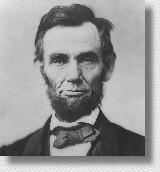
 Abraham Lincoln was born on Feb. 12, 1809, and became the 16th president of the United States. He guided his country through the most devastating experience in its national history, the Civil War. He is considered by many historians to have been the greatest American president.
Abraham Lincoln was born on Feb. 12, 1809, and became the 16th president of the United States. He guided his country through the most devastating experience in its national history, the Civil War. He is considered by many historians to have been the greatest American president.
On April 14, 1865, five days after the end of the Civil War, Lincoln attended a performance at Ford's Theatre in Washington, where he was shot by John Wilkes Booth; he died the next day.
Lincoln's achievements ... saving the Union and freeing the slaves ... and his death just at the war's end, assured his continuing fame. His eloquence as a public speaker is exemplified in the Gettysburg Address, which he made in November 1863, to help commemorate the soldiers killed in Battle of Gettysburg, a decisive conflict of the Civil War. The speech lasted a mere two minutes, and did not make much of an impression on the audience. Over time, his speech with its ending words - government of the People, by the People, for the People - has come to symbolize the definition of democracy itself.
Here then is Abraham Lincoln's famous Gettysburg Address.
"Four score and seven years ago our fathers brought forth on this continent, a new nation, conceived in liberty, and dedicated to the proposition that all men are created equal.
Now we are engaged in a great civil war, testing whether that nation, or any nation so conceived and so dedicated, can long endure. We are met on a great battlefield of that war. We have come to dedicate a portion of that field, as a final resting place for those who here gave their lives that that nation might live. It is altogether fitting and proper that we should do this.
But in a larger sense, we cannot dedicate - we cannot consecrate - we cannot hallow - this ground. The brave men, living and dead, who struggled here, have consecrated it, far above our poor power to add or detract. The world will little note, nor long remember, what we say here, but it can never forget what they did here. It is for us the living, rather, to be dedicated here to the unfinished work which they who fought here have thus far so nobly advanced.
It is rather for us to be here dedicated to the great task remaining before us - that from these honored dead we take increased devotion to that cause for which they gave the last full measure of devotion - that we here highly resolve that these dead shall not have died in vain - that this nation, under God, shall have a new birth of freedom - and that government of the people, by the people, for the people, shall not perish from the earth."
|
Powerful Words
|